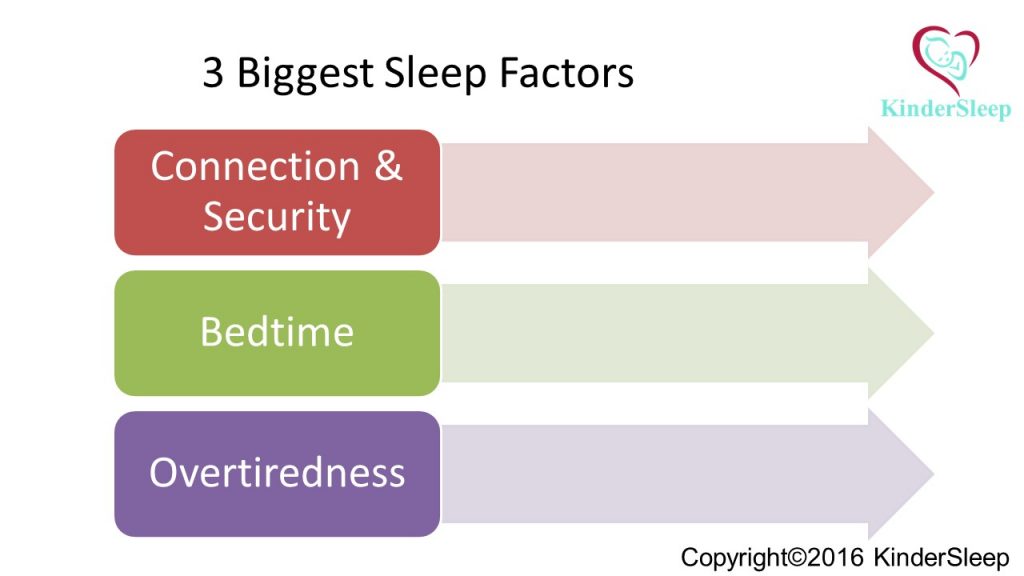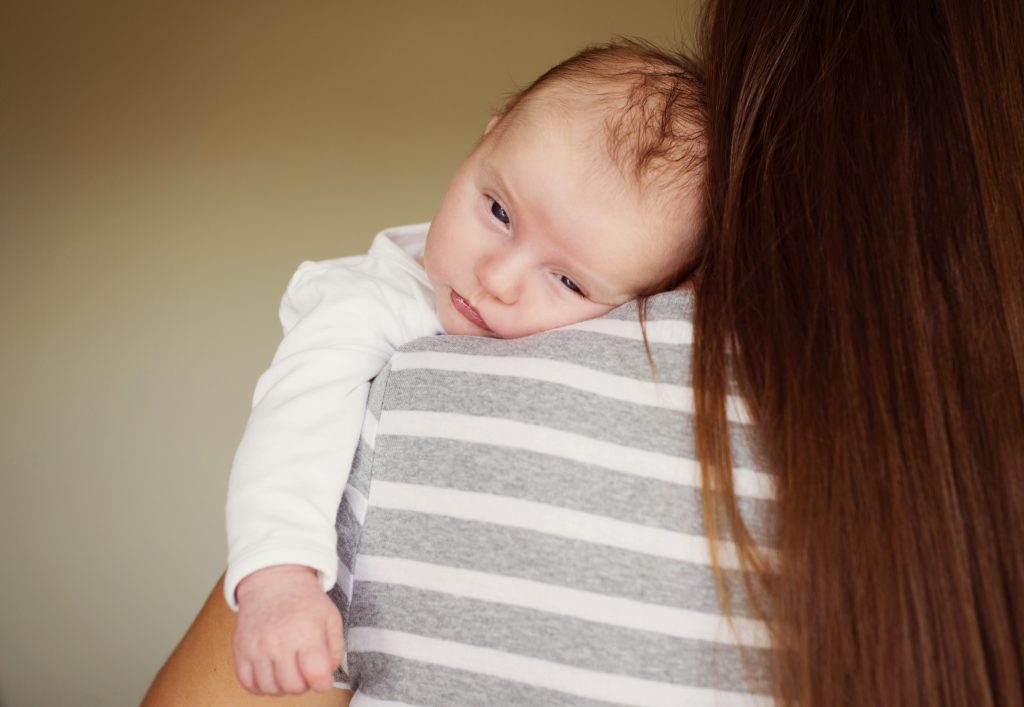If you are struggling to get you little one to fall asleep or stay asleep through the night, there are three key things to keep in mind that can improve sleep right away at any age. These key components can help your child fall asleep better at bedtime and sleep in longer in the morning. They can also prevent unnecessary night wakings. Sometimes just simple, gentle changes can have a significant impact on sleep even without sleep training or sleep coaching.
Keep these three factors in mind when you are looking for a sleep solution for your baby or child. Whether you prefer not to do sleep training, you are using a cry it out strategy, or you are looking for a gentle sleep coaching strategy, being mindful of your child's need to feel safe, secure and connected, and, their bedtime conditions and overtiredness, will have a big impact to improve sleep for your child and you.
3 Key Factors for Better Sleep

1. Connection and Security
The need to feel safe. connected, loved and comfortable is a vital component to be able to sleep for children and adults. These feelings of connection and safety stem from attachment that starts to develop in infants and young children through loving interactons with parents. Healthy attachment is important for children and adults no matter what parenting style you identify with. Positive daytime interactions, can carry over to the evening and night to promote good sleep.
The most important thing you can do before bed is to be calm and have a moment of connection with your child. This may be a cuddle, reading a story, I love yous, and kisses. If your house is hectic or you are stressed out, it might be helpful to take a few moments to calm or ground yourself before engaging in your bedtime routine. You can also take some deep breaths together with your child. If you are calm, you can download that calm into your child and your little one will understand that all is safe and well with the world and it is okay to sleep.
“Your primary aim at bedtime is to bring your child down from a super alert awake state by activating the calming brain chemical oxytocin and the sleep hormone Melatonin.”
Margot Sunderland, Science of Parenting p. 66 1
2. Bedtime
Bedtime is the most significant time for sleep.
The bedtime conditions have a significant impact on the remainder of the night. Whatever your child has at bedtime to fall asleep will be needed to stay asleep or fall back to sleep in the night. If your child’s sleep location or environment has changed through the night, they are more likely to wake and need what they had at the beginning of the night. For example if your little one falls asleep while feeding in a parent’s arms, and then wakes up later in their crib, this will be very alerting. It may contribute to your child becoming more wakeful and even distressed and they will likely need the bedtime conditions replicated to fall back to sleep – or they may need more support than they got at bedtime. You may have experienced this yourself – you go to bed with your pillow and duvet and then in the night one or both go missing. Instead of rolling over and going back to sleep, you wake up full and need these items to fall back to sleep. You may even be annoyed that they went missing. In the middle of the night, if your child wakes, they will need at least the same environmental conditions and supports given at bedtime, if not more to fall back to sleep. What happens at bedtime not only impacts the rest of the night, it can also have a significant impact on the daytime sleep as well.
There are several things that make bedtime time such a significant time for sleep.
-
Expectations are set at bedtime
Bedtime is when we as parents, set the expectation of how the child is to fall asleep. We let our children know what we are going to do to help them sleep and what part they will need to do. So if you are feeding or comforting your baby to sleep, they are going to expect you to come back and feed or comfort them back to sleep if they wake in the night. The same can be true if you are feeding or comforting your child to a drowsy state at bedtime. In this case, it is unlikely that they know how to fall asleep from fully awake in the middle of the night and will need your assistance again if they awaken fully.
-
Learning sleep skills is easier at bedtime
The evening is the easiest time to learn sleep skills. There is significant felt sleep pressure from being awake most of the day, coupled with Melatonin and a significant drop in day system hormones like Adenosine. This creates the ideal time to help your child learn new sleep habits.
-
Bedtime is the best time to start new habits
When making changes to your baby’s sleep, bedtime is the best place to start. It will be the easiest and gentlest part of sleep behaviors to tackle first. In fact bedtime is so significant that research shows if you only work on bedtime skills alone, you still have a 50% or better chance that sleep will improve through the entire night. 2 With that in mind, if you are planning to do sleep training or gentle sleep coaching, you could start by only working on bedtime habits, while continuing to support your child during night wakings. There is a chance that this can improve sleep through the night as well, which in turn may improve naps without doing any further coaching.
3. Overtiredness Effects Sleep
Getting overtired or being awake too long, has a significant impact on your child's sleep. It can make it more difficult to fall asleep and can also impact staying asleep through the night and cause early rising. The most significant time to avoid overtiredness is in the afternoon and right before bedtime.
Keep your baby from getting overtired. This is a key principle in helping your little one get better sleep. Getting overtired between naps and before bed has the greatest impact on sleep. Most children have a maximum length of time they are able to be awake before they get overtired. This is referred to as the wakeful window. Being awake longer first thing in the morning does not seem to have any negative effects on most babies, but has a significant impact between naps and before bedtime. Overtiredness not only affects babies, it also affects older children and adults.
Overtiredness Can Cause:
- Difficulty falling asleep
- Fragmented sleep cycles
- Night waking
- Lighter sleep in early morning
- Waking up too early
Avoiding Overtiredness
- The amount of day sleep and number of naps are not as important as the wakeful windows
- Avoid overtired
- Monitoring Sleep Signs
- Understanding average wakeful windows (See Wakeful Window Chart)
Managing overtiredness
- Watch babies sleep signs
- Respect baby’s unique wakeful window
- Short nap = short wakeful window
- Add an extra nap or move bedtime earlier
"In order to keep your baby from getting overtired you will need to recognize their tired signs and natural wakeful windows. This is primarily done by observation. Understanding what happens when your baby gets overtired and when their typical wakeful windows occur will help you determine how long your baby can be awake without getting overtired and what their natural bedtime is. This will help you shape your baby’s schedule to keep them from getting overtired, which will have a significant positive influence on your baby’s ability to fall asleep and get high quality sleep."
Excerpt from Loved to Sleep by Jen Varela and Andrea Strang 3
Wakeful Windows Chart
Some children may be able to successfully stay awake longer than these windows without any sleep issues at all. After working with over 8,000 children, we have found when there is a sleep issue, this guide is helpful in resolving it. Even so, there can be slight variations in the length of wakeful window for each child, so we recommend observing your child's sleep signs between naps or before bedtime to determine your child's unique wakeful window.
| Age | Average Max. Wakeful Window | Average Bedtime |
| 0-6 weeks | Up to 1 hour | N/A |
| 6 weeks to 3 months | 1-1.5 hours | N/A |
| 3 – 4.5 months | 1.5-2 hours | N/A |
| 4.5 – 6 months | 2-2.2 hours | 6-6:30pm |
| 7-9 months | 2.5 hours | 6:30-7:30pm |
| 12 months | 3 hours | 7-7:30pm |
| 18 months | Up to 4 hours before bedtime | 7-7:30pm |
| 2.5 years | Up to 6 hours before bedtime | 7-8pm |
KinderSleep Adapted from: Australian Sleep Clinic
*After a nap that is 45 minutes or longer. If the nap is shorter, the wakeful window will be shorter
*Some children may be able to stay awake longer with no negative sleep implications. However, being awake too long during the day often plays a role in sleep challenges and early rising.
Book a free 15 minute consult
to discuss your family's sleep!
References
1. Sunderland, M. (2008). The science of parenting. New York, NY: DK Publishing.
2. Mindell, J.A., Telofski, L.S., Wiegand, B., & Kurtz, E.S. (2009). A nightly bedtime routine: Impact on sleep in young children and maternal mood. Sleep, 32(5), 599-606.
3. Loved To Sleep: Gently Nurturing Your Baby Towards Better Sleep by Jen Varela and Andrea Strang






Get more SLEEP TIPS for pregnancy and new babies, in the FREE guide:
“SLEEP SURVIVAL TIPS FOR NEW PARENTS” https://mailchi.mp/1c32337175af/sleep_survival_guide